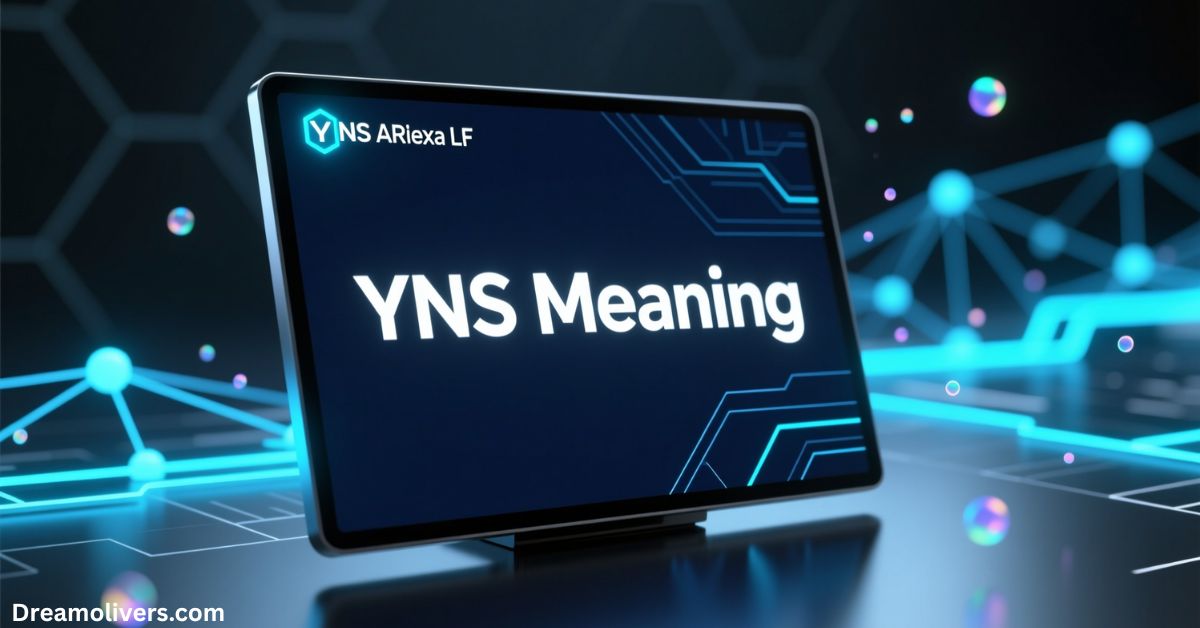In the ever-shifting world of digital communication, acronyms and colloquialism fly fast. One you might have seen recently is YNS. In this article I’ll unpack the abbreviation, explore its semantic variation, its roots, and show real-life chat or email instances so you can spot it, interpret it, and use it (or avoid it) appropriately.
We’ll also touch on related concepts from Core Concepts / NLP Terms, such as contextual meaning, tone and intent, discourse pragmatics, cultural semantics, and more.
What Does YNS Mean?
Here are the primary meanings for YNS, depending on usage context, register (formal vs. informal language), and audience:
- YNS = “Youngins” (i.e., young ones or younger people).
- Origin: Often traced to African American Vernacular English (AAVE), where “youngins” means younger folks. (ContentStudio)
- In many social-media posts (on platforms like TikTok, Instagram, Twitter) “YNS” simply means “young’uns” or “younger generation.” (ContentStudio)
- Example nuance: “Look at the YNS thinking they invented everything.” That usage has a slight dismissive tone about younger people’s behaviour.
- YNS = “You’re Not Serious”
- Less documented but used in chat contexts to express disbelief: e.g., “YNS?!” meaning “You’re not serious, right?”
- This shows how abbreviation and acronym usage evolves swiftly in messaging apps.
- In this sense the meaning depends heavily on tone and intent, as well as pragmatic context (what led to the phrase).
- YNS = a derogatory slur or coded form of one
- Some sources list “YNS” as shorthand for “young n****rs,” a deeply offensive slur. (Know Your Meme)
- If used in this way, its sentiment and tone become hostile, and the term is tied to sociolinguistic variation, cultural semantics, and generational or racial dynamics.
- Because this usage is extremely sensitive, it should be treated with caution and awareness of audience, context, and register.
Because of these multiple possibilities, meaning disambiguation becomes essential: you must consider usage context, medium, speaker, and recipient before interpreting “YNS.”
Why These Meanings Matter

Here’s how different linguistic concepts tie into our discussion of YNS:
- The fact that “YNS” can mean “youngins” or “you’re not serious” is a great example of polysemy and lexical semantics: one string means two (or more) things.
- The shift from a community-specific slang (AAVE) to broader social-media usage highlights language evolution and generational language dynamics.
- The usage across mediums (text, email, social media, chat) illustrates register sensitivity: what works among friends may fail in a work-email scenario.
- Interpreting “YNS” correctly requires checking pragmatic context, conversational implicature, and discourse pragmatics: are they joking, being sarcastic, insulting, or just tagging “youngins”?
- It also touches on sociolinguistic variation, because younger users might use it one way and older users another; plus cultural semantics, given the AAVE origins.
- Finally, intention modeling and tone detection (even sarcasm detection) come into play: you must ask, what did the sender intend by typing “YNS”?
Real Chat & Email Scenarios
Let’s look at real-world style examples. They’ll help illustrate how YNS appears across digital communication contexts, and how you should respond.
Scenario A: Informal Chat Among Friends
Chat excerpt (via WhatsApp)
Maya: “Just pulled an all-nighter for the presentation.”
Jay: “Bro — YNS? You serious?”
Here “YNS” clearly means “You’re not serious”. Jay expresses disbelief (tone = surprise + mild humor). Usage is informal; register = casual; tone and intent = playful disbelief.
Scenario B: Social Media Caption
Post on Instagram:
“When the new YNS in the group try to act like they know what’s up 🤓”
Here “YNS” means “youngins”, i.e., younger group-members. The tone is slightly condescending but humorous; this reflects generational language and identity expression (older vs. younger). The semantic variation is clear: note difference between meaning #1 vs meaning #2.
Scenario C: Work Email (Wrong Register)
Subject: “Re: Project timeline”
Hi Sandra,
I noticed some of the YNS in the team missed yesterday’s meeting. Could we address this?
Best,
Ron
Here “YNS” would be very inappropriate. It might be interpreted as “youngins” or worse—the slur version—thus failing polite politeness strategy and causing offence. In a professional email you’d prefer: “some of the younger members of the team”.
Scenario D: Texting Between Siblings
Alex: “Did you really spend $200 on sneakers?”
Chris: “Yeah man, YNS. Had to…”
Here Chris uses “YNS” as casual “You’re not serious?” as in “You couldn’t be serious about that purchase.” The intention: playful teasing. Tone and intent = surprise + friendly banter.
Scenario E: Fanfiction Chat (Y/N confusion)
In a fanfiction forum:
“YN = Your Name. If you’re reading this the Y/N (that’s you!) just saved the city.”
Different acronym but worth noting because confusion occurs: YNS vs Y/N. This shows the risk of mis-interpreting abbreviation when usage context isn’t clear.Read Also: PMO Full Form in Chat (2026): Meaning, Usage, and Real Examples
How to Use (or Not Use) YNS
Here are some guidelines to help you decide whether to use “YNS,” and how to interpret it safely.
✅ Appropriate usage:
- In informal chat with friends you know well and where meaning is clear.
- When you intend a playful or humorous tone, and you believe recipient will not mis-interpret.
- When “youngins” usage is clear (older speaker referring to younger group, e.g., “the YNS keep changing the rules”).
🚫 Avoid usage:
- In formal contexts (emails, professional chats) — use more standard language.
- When there is risk of misunderstanding the meaning as a slur or offensive term — especially across cultures or generations.
- If you are unsure the recipient understands the slang or will interpret the tone correctly.
- If you suspect sensitivity around generational or racial identifiers — because the slur version of YNS exists.
🔍 Interpretation tips:
- Always ask: what is the usage context? Platform (TikTok vs email), speaker, audience.
- What is the tone and intent? Friendly teasing, dismissive, hostile?
- Look for register: formal vs informal. If in formal writing, assume “YNS” is likely mis-used.
- Check for discourse pragmatics: is the term used as part of generational commentary (“those YNS”) or as surprise (“YNS?!”)?
- Look for code-switching or sociolinguistic variation: younger/older, cultural groups, community slang.
- If uncertain: interpret conservatively or ask the sender to clarify. Politeness strategy suggests avoiding jumping to offence unless clearly indicated.
Origins & Evolution
The term “YNS” demonstrates language evolution at work. Here’s a quick timeline:
- Earliest usage: AAVE origins as “youngins” or “young’n” meaning younger folks.
- Spread via hip-hop culture and social media, where “YNS” shorthand emerged. (ContentStudio)
- On platforms like TikTok and Reddit, the term appears with posts about generational differences, younger behaviour, etc. (Know Your Meme)
- Some users reinterpret or re-use the term (or accidentally pick it up) without full awareness of possible offensive meaning (“young n***s”). This shows how digital communication can carry a term beyond its original community or context, bringing issues of cultural semantics to the fore. (famiguard.com)
- Over time, users may reclaim or resist the term – this links to identity expression (younger people embracing “youngins” ironically) and reclamation of terms.
So “YNS” is a good case study in how discourse pragmatics, sociolinguistic variation, and semantic shift play out in real-life language.
Quick Reference Table
| Acronym/Slang | Full Form(s) | Usage Context | Tone & Register |
|---|---|---|---|
| YNS | “Youngins” (young ones) | Social media, chat among peers | Casual, slightly dismissive or playful |
| YNS | “You’re not serious” | Text or chat response | Surprised, humorous, informal |
| YNS | “Young n***s” (slur) | Some online videos/memes | Offensive; avoid |
Final Thoughts
If you see YNS popping up on your feed, in a group chat, or in a caption, you’re equipped now to ask: what is the intention, who is the speaker, what is the register, and how should I interpret the meaning? The term reminds us that language carries social meaning, culture, identity, and tone beyond just the surface acronym.
In this world of rapid language evolution, spotting a slang term is only the first step. Understanding contextual meaning, checking for tone and intent, and navigating generational language wisely matter just as much. Whether you choose to use the term or not, each choice reflects your awareness of digital communication, sociolinguistic variation, and respectful expression.
So next time someone drops “YNS” in chat, you’ll know: Are they teasing a younger generation, checking you’re serious, or (worse) using a harmful slur? That layer of interpretation—this is what makes communication rich, complex, human.

DreamOlivers, guided by Tina Hudson, is a spiritual space for inner peace and growth. Offering profound insights, it helps you connect with your higher self. Embrace wisdom and inspiration for a balanced, fulfilling life.

